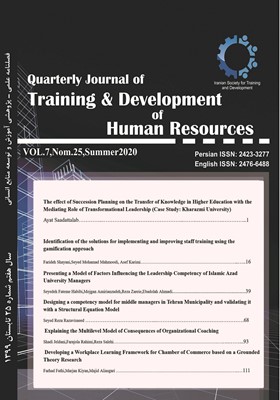Developing a Workplace Learning Framework for Chamber of Commerce based on a Grounded Theory Research
Subject Areas : روش های نوین آموزش وتوسعه منابع انسانیFarhad Fathi 1 , Marjan Kian 2 * , Majid Ali Asgari 3
1 -
2 -
3 -
Keywords: Workplace Learning, Curriculum, Grounded Theory, Chamber of Commerce, ,
Abstract :
The aim of the present study was to develop a framework for workplace learning. The research paradigm was qualitative and the grounded theory research method was use. The research population consisted of all the employees and members of Chamber of Commerce. Then 18 informants were selected by targeted sampling method until reaching the data saturation. The research tool was an in-depth semi-structured interview. In order to analyze the data, coding and categorization were used by Atlas ti software and in three stages of noticing, collecting and thinking. In order to evaluate the data strength in the present study, three criteria of "acceptability", "reliability" and "verifiability" were used. Based on the findings, the framework of the workplace learning consisted of the environment (equality and justice, working environment, learning culture and supportive work environment), the employees (interest in work and learning, responsibility and intelligence and discipline), the management (leadership power, scientific literacy And ethical virtues), the curriculum (goal setting and purposefulness, educational content, teachers 'ability, supervision and implementation, feedback and correction) and the interaction and integration (management-staff interaction, colleagues' interaction with each other, combination of formal and experimental education, integration). Outcomes of workplace learning include organizational efficiency and effectiveness, financial benefit, cohesiveness and expertise, career advancement along with employee motivation.
1. Safaei Movahed S. Heutagogy- based Workplace Curriculum Development Model (HWCDM). Journal of Curriculum Studies (J.C.S), 2019; 13 (51): 5-26 (in Persian).
2. Doosti Hajiabadi, H., Fathi Vajargah, K., Khorasani, A. Conceptualizing of workplace curriculum discourses; Neglected or emerging discourse. Research in Curriculum Planning, 2017; 14(52): 28-34.
3. Kyndt E, Vermeire E, Cabus S. Informal workplace learning among nurses. Journal of Workplace Learning. 2016 Sep 12.
4. Fenwick T. Workplace learning: Emerging trends and new perspectives. New directions for adult and continuing education. 2008 Sep;2008(119):17-26.
5. Eraut, Michael. (2004). Informal learning in the Workplace, Studies in Continuing Education, 26(2), 247-273.
6. Marsick VJ, Watkins KE, Callahan MW, Volpe M. Informal and incidental learning in the workplace. InHandbook of research on adult learning and development 2008 Nov 19 (pp. 592-622). Routledge.
7. Hicks E, Bagg R, Doyle W, Young JD. Canadian accountants: Examining workplace learning. Journal of Workplace Learning. 2007 Feb 27.
8. Jacobs RL, Park Y. A proposed conceptual framework of workplace learning: Implications for theory development and research in human resource development. Human resource development review. 2009 Jun;8(2):133-50.
9. Billett S. Learning through work: workplace affordances and individual engagement. The journal of workplace learning. 2001 Jul 18;13(5):209-14.
10. Tynjälä P. Perspectives into learning at the workplace. Educational research review. 2008 Jan 1;3(2):130-54.
11. Boud D, Garrick J, Greenfield K. Understanding learning at work. Performance Improvement. 2000 Nov;39(10):45-7.
12. Parding K, Berg-Jansson A. Conditions for workplace learning in professional work. Journal of Workplace Learning. 2018 Mar 5.
13. Kopp T, Kinkel S, Schäfer T, Kieslinger B, Brown AJ. Measuring the impact of learning at the workplace on organisational performance. International Journal of Productivity and Performance Management. 2020 Feb 8.
14. Steil AV, de Cuffa D, Iwaya GH, dos Santos Pacheco RC. Perceived learning opportunities, behavioral intentions and employee retention in technology organizations. Journal of Workplace Learning. 2020 Feb 5.
15. O'Brien E, McCarthy J, Hamburg I, Delaney Y. Problem-based learning in the Irish SME workplace. Journal of workplace learning. 2019 Aug 12.
16. Kusaila MM. Impact of informal learning in the accounting profession. Journal of Workplace Learning. 2019 Aug 20.
17. Safaei Movahhed, S. A typological look into learning culture in workplaces: from malicious to demanding!. 11th Intenational Conference on Research Work and Learning, Department of Continuing Education Justus-Liebig-University Giessen (Germani), 2019.
18. Mehmandoost Ghamsari Z S, Fathi Vajargah K, Khorasani A, Safayi Movahed S. Identification and Validation of Effective Factors on the Establishment of Workplace Curriculum Model Emphasizing on Economic Development Consequences. IUESA. 2019; 7 (25) :63-79.
19. Ghanbari, S., Zandi, K. Designing a systematic model of factors affecting learning transfer to workplace (A model for improving the productivity of organizational trainings). , 2018; 12(2(45)): 115-151.
20. Barshan, A., Safaei Movahhed, S., Moghadam Zadeh, A., Farzad, V., Kiamanesh, A. Identifying the Effective Factors on the Formation of Learning Transfer to the Workplace in In-Service Training of Kerman copper industry. jiera, 2018; 11(39): 113-134. doi: 10.22034/jiera.2018.61046.
21. Manuti A, Pastore S, Scardigno AF, Giancaspro ML, Morciano D. Formal and informal learning in the workplace: a research review. International journal of training and development. 2015 Mar;19(1):1-7.
22. Strauss, A, Corbin, Juliet. Principles of qualitative research methods. Translation: Buick Mohammadi, Tehran, Institute of Humanities and Cultural Studies,2011.
23. Charmaz K, Belgrave LL. Grounded theory. The Blackwell encyclopedia of sociology. 2007 Feb 15.
24. Friese S. Qualitative data analysis with ATLAS. ti. SAGE Publications Limited; 2012.

